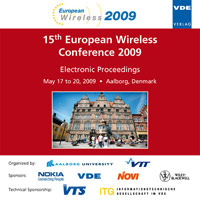Optimal Sensing Cooperation for Spectrum Sharing in Cognitive Radio Networks
Conference: European Wireless 2009 - 15th European Wireless Conference
05/17/2009 - 05/20/2009 at Aalborg, Denmark
Proceedings: European Wireless 2009
Pages: 6Language: englishTyp: PDF
Personal VDE Members are entitled to a 10% discount on this title
Authors:
Zhang, Yan; Xiang, Jie; Xin, Qin (Simula Research Laboratory, Norway)
Øien, Geir E. (Norwegian University of Science and Technology, Norway)
Abstract:
Cognitive radio is a highly promising technology to efficiently solve the spectrum scarcity challenge and harmonize the networks heterogeneity. Through component spectrum sharing, Secondary Users (SUs) are able to opportunistically access licensed spectrum shared with the primary system. In the literature, spectrum sharing is normally investigated on the basis of the assumption that the spectrum sensing is perfect. However, in reality, the spectrum sensing can not be ideal, as demonstrated by two non-zero metrics, probability of misdetection and the probability of false alarm. In this paper, we focus on the interaction between spectrum sensing and spectrum sharing. In particular, we will study the optimization of cooperative spectrum sensing for achieving maximum spectrum utilization in cognitive radio networks. A new percentage rule is proposed for the spectrum sensing cooperation, which is more generic than quantity-based rules and is applicable in both sparse and dense sensing scenarios. An analytical model is presented to analyze the spectrum sharing performance. Numerical examples are presented to show the optimal percentage of cooperating sensors in achieving maximum utilization, which simultaneously achieve minimum blocking probabilities. Results are also shown to explore the impact of key system parameters on the performance metrics.


